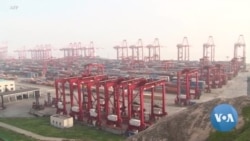Hello and welcome to VOA Asia Weekly. I'm Chris Casquejo in Washington.
Making headlines across Asia.
China said the black boxes in last month’s deadly China Eastern Airlines crash were badly damaged.
Malaysian immigration officials said six Rohingya refugees died after escaping from a detention facility.
At least one person is dead and a dozen injured after Sri Lankan police opened fire on protesters.
Nobel laureate Jose Ramos-Horta won East Timor’s presidential election in a landslide.
The U.S. promised to maintain the "strongest possible" joint deterrence with South Korea over the North’s escalating threats.
The top leaders from Japan and Switzerland urged cooperation to stop the Russian invasion of Ukraine.
And those are your top Asia headlines.
Authorities in the Chinese financial hub, Shanghai, released another 4 million people from strict COVID-19 lockdown rules, as the city restores its economic activity.
Some factories in Shanghai are slowly resuming operations, including electric car company Tesla, which restarted production Tuesday after being idled for about three weeks. More than 600 firms are on a list of key industries and companies that have been allowed to either resume or keep their operations running.
The International Monetary Fund slashed its forecast for global economic growth to 3.6 percent this year, saying Russia's war in Ukraine threatens a fragile recovery from disruptions caused by the pandemic. VOA’s Patsy Widakuswara has this report.
Russia's war in Ukraine and Western sanctions against Moscow have disrupted global commerce, pushed up oil prices, threatened food supplies and increased uncertainty as the world struggles to recover from the pandemic, causing the International Monetary Fund to downgrade its global economic outlook.
“Even before the war, inflation in many countries had been rising due to supply demand imbalances and policy support during the pandemic, prompting a tightening of monetary policy.”
The IMF slashed its global growth forecast from 4.4 percent to 3.6 percent; the World Bank, from 4.1 percent to 3.2 percent.
Increased energy and commodity prices have led to less output and more inflation. Add to that, a slowing of the Chinese economy due to frequent lockdowns caused by the omicron variant of the coronavirus.
“First of all, China has imposed a quarantine of one week on goods that come into China, that means that manufacturers that use chips from other places such as South Korea are not getting the inputs they need to make the goods in China. Second, there's congestion at the ports because of the lockdown, such as Hong Kong and Shanghai.”
A key goal for central bankers attending the spring meetings of the IMF and World Bank in Washington, is to curb inflation without sending the world into recession – by gradually increasing interest rates, preferably in a coordinated way.
“That would prevent inflation from spilling over from one place to the other. But it's a delicate task because we do have equity markets that are very buoyant, we've got housing markets that are very buoyant.”
Amid Western efforts to isolate Russian President Vladimir Putin, coordination may prove challenging. The U.S. is skipping some of the group of twenty – G-20 – finance ministers’ meetings this week, to protest Moscow’s participation in the group over its actions in Ukraine.
Patsy Widakuswara, VOA News, Washington.
Stay up to date with VOA Asia. Please follow us on Facebook, Twitter, Instagram and YouTube at VOA Asia. Our website is voanews.com. This is VOA Asia Weekly.
The Prime Minister of the Solomon Islands, Manasseh Sogavare, is assuring his country's neighbors that a security agreement with China will not impact "peace and harmony" in the region.
Meanwhile, the U.S. is sending two top officials to the Solomon Islands over concerns that China could establish a military presence in the South Pacific island nation.
Finally on VOA Asia Weekly.. Muslims in Bangladesh are enjoying a more normal Ramadan after pandemic restrictions curtailed the last two years' events.
Markets are busy again, people are able to travel to see family and friends, and mosques can once again host large group iftars.
That’s all for now.
Thank you for joining us on VOA Asia Weekly. I’m Chris Casquejo. See you next week.













